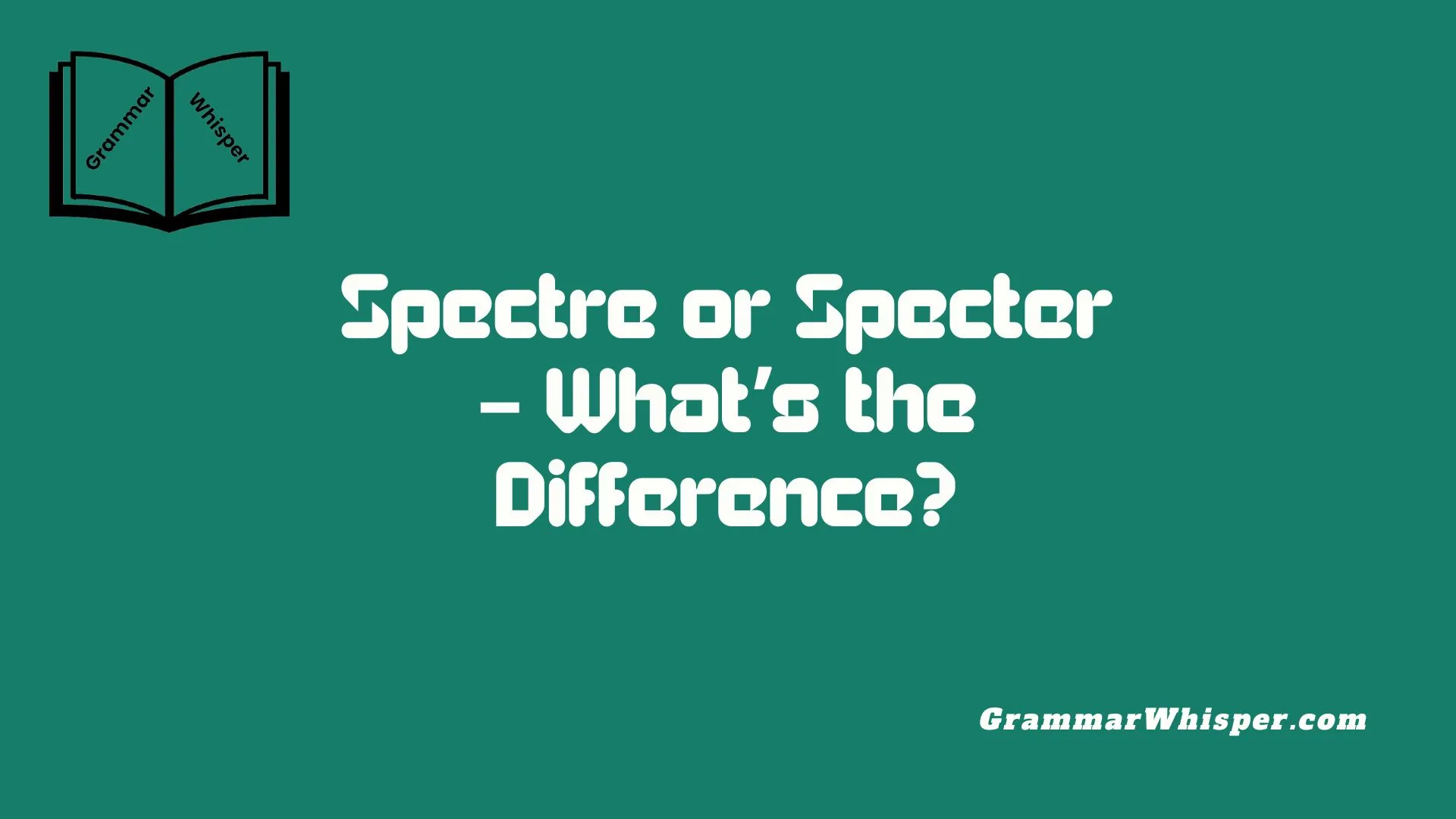The choice between Spectre or Specter may seem like a small matter of spelling, but it carries a much larger cultural and linguistic footprint. From editing a travel magazine to understanding regional norms in writing, these words showcase a deeper identity rooted in British and American traditions. In American writing, “specter” is the go-to, while in Canada, India, and much of Europe, the older British form “spectre” persists. Though identical in meaning – a ghost, a haunting presence, something mysterious – the usage goes beyond mere preference.
It reflects language evolution, history, and how English, as a global language, has morphed and traveled across borders due to colonial expansion and educational systems. Writers make this choice based on audience, intent, and the tone they wish to set. These two variants carry different voices and a unique literary impact, echoing the long journey of words and their lasting legacy.
Spectre vs. Specter: At a Glance
Here’s a quick comparison to get started:
| Word | Region | Meaning | Common Usage |
| Specter | United States | Ghost; looming threat | American literature, politics, media |
| Spectre | UK, Commonwealth | Same meaning | British literature, global cinema, classic texts |
While both spellings are correct, their usage depends heavily on geographic context and style conventions.
Etymology and Historical Roots of “Specter” and “Spectre”
The word traces back to Latin – specifically, the term spectrum, meaning “appearance” or “image.” This morphed through Old French as spectre before arriving in Middle English around the 1600s.
Timeline of Evolution
- Latin: Spectrum – appearance, apparition
- Old French: Spectre – ghost, image
- Middle English: Specter (borrowed from French)
- Modern English: Both specter and spectre used, split by region
So while both spellings stem from the same source, cultural and editorial preferences led to their divergence.
Quote: “Words, like ghosts, evolve with the societies that use them.” – Oxford Linguistics Journal, 2019
The British vs. American English Divide
The difference between “spectre” and “specter” is one example of the wider American vs. British spelling divide. This began with Noah Webster, the American lexicographer who spearheaded spelling reform in the early 1800s.
Why American English Uses “Specter”
- Noah Webster’s dictionary simplified spellings to reflect pronunciation
- Eliminated French-style endings (e.g., -re, -our) in favor of more phonetic alternatives (e.g., -er, -or)
- Aim: create a distinct American identity in language
Why British English Retains “Spectre”
- British spelling remains closer to French-influenced traditions
- Seen as more formal, classical, and traditional
Here’s a comparison table of similar spelling shifts:
| British English | American English |
| theatre | theater |
| centre | center |
| litre | liter |
| spectre | specter |
Important: Canadian English and Australian English mostly align with British spelling but allow some American variants.
Spectre in British English: Literary and Journalistic Usage
In the UK, “spectre” remains the dominant form across literature, journalism, and academia.
British Literary Examples
- Charles Dickens, in A Christmas Carol, wrote of ghostly spectres haunting Ebenezer Scrooge.
- Mary Shelley’s Frankenstein references the spectre of death.
- In Shakespeare’s Hamlet, the prince refers to his father’s ghost as a spectre.
British Media Headlines
- “The Spectre of Inflation Looms Over the Economy” – The Guardian
- “Spectres of Empire Haunt Brexit Britain” – The Independent
The British press often uses “spectre” in both literal and metaphorical contexts, invoking it to mean threats, fears, or unresolved history.
Specter in American English: Usage in Modern Writing
Across the Atlantic, “specter” is the preferred form in all writing contexts.
American Literature and Media
- Edgar Allan Poe’s gothic works use “specter” to describe eerie presences.
- Stephen King often uses “specter” in horror contexts.
- Politicians speak of the “specter of nuclear war” or “specter of recession.”
Examples from U.S. News Media
- “The Specter of AI Regulation” – The New York Times
- “Specter of Political Violence Haunts the Nation” – CNN
Here, “specter” often conveys metaphorical dread – the threat of something sinister just on the horizon.
Cultural and Symbolic Impact in Media & Pop Culture
James Bond and “SPECTRE”
One of the most iconic uses of the British spelling comes from the James Bond franchise.
- SPECTRE: Special Executive for Counter-intelligence, Terrorism, Revenge, and Extortion
- Introduced in Ian Fleming’s novels and revived in the 2015 film Spectre
- Despite being globally distributed, the franchise retained the British spelling, reinforcing the organization’s UK literary origin
Interesting Fact: The word “spectre” was deliberately chosen to convey an elusive, menacing presence, in line with the group’s secretive nature.
Other Cultural References
- Marvel Comics uses “Specter” for ghost-themed villains.
- DC Comics has The Spectre, a supernatural spirit of vengeance.
- Films like Poltergeist and The Sixth Sense avoid the word but embody its meaning.
This cross-media usage solidifies both spellings as culturally embedded, though the spelling often follows the origin of the media’s creators.
Global Usage of Spectre and Specter in English Variants
The split in spelling isn’t just UK vs. US – other English-speaking countries vary as well.
Quick Regional Guide
| Country | Preferred Spelling | Notes |
| United States | Specter | Standardized via dictionaries and style guides |
| United Kingdom | Spectre | Official and traditional spelling |
| Canada | Spectre (mostly) | British spellings still dominate |
| Australia | Spectre | British influence remains strong |
| India | Spectre | Follows British educational system |
| South Africa | Spectre | UK alignment |
In digital media, American spelling is increasingly common due to global platforms, but official publications in non-US regions typically retain “spectre.”
Choosing the Right Spelling: Guidance for Writers and Editors
Whether you’re a writer, editor, brand strategist, or student, choosing between “spectre” and “specter” depends on your:
- Audience
- Style guide
- Intended tone
Style Guide Recommendations
| Style Guide | Recommended Spelling | Region |
| AP (Associated Press) | Specter | US Media |
| Chicago Manual of Style | Specter | US Academic/Books |
| Oxford Style Manual | Spectre | UK/International |
| Australian Style Manual | Spectre | Australia |
Professional Writing Best Practices
- Be consistent throughout your content.
- Consider your target readership.
- Follow your client’s or publication’s editorial guidelines.
- Avoid mixing spellings unless quoting directly.
Mnemonic Devices to Remember the Difference
Use these easy tricks to remember which spelling to use:
- “Specter” = ER = USA Think of “ER” as in “USA” where emergency rooms (ER) are common.
“Spectre” = RE = Royal English“RE” at the end for “Regal” or “Royal,” pointing to British tradition.
Cheat Sheet: Spelling Reminders
| Spelling | Memory Tip |
| Specter | “ER” is in Americera |
| Spectre | “RE” is in Royal English (UK spelling) |
Examples in Context
Here are sentence examples showing both spellings in proper usage:
Using Specter (American)
- “The specter of unemployment loomed over the city.”
- “A ghostly specter drifted through the abandoned mansion.”
Using Spectre (British)
- “The spectre of poverty haunts the old mining towns.”
- “He claimed to see a spectre near the moors on foggy nights.”
Notice how both versions carry the same meaning but reflect regional norms.
Final Thoughts
The difference between “spectre” and “specter” isn’t just cosmetic – it reflects linguistic history, cultural tone, and even branding decisions.
Whether you’re writing fiction, editing a news piece, or crafting a business blog, making informed choices about spelling enhances your credibility and clarity.
The next time you’re haunted by this choice, you’ll know exactly which ghost to invite.
FAQs
Is one spelling more correct than the other?
No. Both “spectre” and “specter” are correct. Use based on region and audience.
Can I use both in one article?
Only if quoting a source that uses the alternate spelling. Otherwise, stay consistent.
Will autocorrect change my spelling?
Yes. Most word processors default to US English, so “spectre” might get flagged unless your settings match British English.
Do style guides care?
Absolutely. Editorial consistency matters. Follow the relevant style guide for your work.











